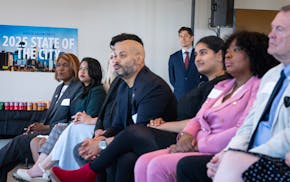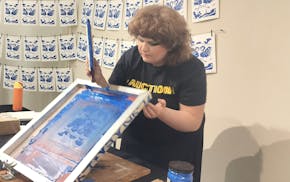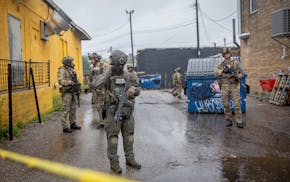The Minneapolis City Council voted Thursday to nix a city plan to overhaul the area where George Floyd died 4½ years ago and instead pursue what had been a discarded option that would include a pedestrian plaza in the area around 38th Street and Chicago Avenue.
In the vision that was adopted, Council Member Jason Chavez, who lived six blocks from the intersection when Floyd was killed, proposed to restrict vehicles in the area to local use and build a pedestrian plaza at 37th Street and Chicago Avenue. Metro Transit would not restore D-Line bus rapid transit service and Route 5 transit service along Chicago Avenue.
"We have one shot to get this right," Chavez said.
His proposal, approved in an 8-5 vote, also includes setting up a task force to look at housing, economic development, a racial justice and healing center in the 38th Street Cultural District and a review of protesters' demands.
After Floyd's killing, protests sprang up where he died, outside what was then called Cup Foods, and protesters took control of the four-block area surrounding the intersection. Streets were closed to traffic and the area evolved into an autonomous zone with little police intervention until June 2021, when the city removed concrete barriers and eventually reopened the street to traffic. The protesters who still meet there have 24 demands for justice, which include requiring police officers to maintain private liability insurance and firing some leaders of the Minnesota Bureau of Criminal Apprehension.
Mayor Jacob Frey's administration had proposed reconstructing and transforming the area — now the site of multiple memorials, artwork, a community garden and a protest space — and allowing traffic to fully return.
The city's plan would restore vehicular access to the neighborhood's numerous driveways, garages and alleys, with full access for transit, emergency vehicles and deliveries. A "flexible street design" would allow closings for public gatherings. The city has not released cost estimates.
Frey said he could support a pedestrian mall, but not the council's "continuous indecision" as it "continues to kick the can down the road," and delay construction. City officials wanted to begin construction next year, after the five-year anniversary of Floyd's killing.
"We need to make a decision," Frey said. "It's been years" since Floyd's police killing.
Chavez said the council wasn't delaying action, it was choosing a direction. Council Member Andrea Jenkins disagreed, saying, "It's a delay."
Public Works Director Tim Sexton told the council that his staff would not be able to "co-design" two alternatives and still begin construction next year. Designs need to be advanced by June, he said.
Jenkins said Thursday's action by the council ignores thousands of hours of staff time spent on the city proposal, when it was decided that a pedestrian mall is not suitable. Jenkins said she's not sure how one council member can dictate "what happens in this city."
"It is shocking to me that you think that can be your edict," Jenkins said.
Council Member Jeremiah Ellison said he wished the council and mayor could hash out their differences as in the past.
"A delay does feel like it is another blow to momentum," he said, later voting for Chavez's proposal.
The city plan would build new streets, bikeways, pedestrian lighting, green spaces, a raised traffic circle in the 38th and Chicago intersection, new, wider sidewalks, upgraded pedestrian ramps and expanded community spaces. It would also preserve the spot where Floyd was killed for a memorial, with no traffic allowed over the place where Floyd took his last breath. It also would leave in place the raised fist installed by sculptor Jordan Powell-Karis at 38th and Chicago and redevelop the former Speedway gas station where protesters still meet into a community space run by a nonprofit. "Mourning Passage" — a list of the names of people killed by police that is repainted on the street annually — would move slightly north.
How they voted
Voting in favor of Chavez's pedestrian plan, which nixed the city's plan, were Council Members Chavez, Robin Wonsley, Ellison, Jamal Osman, Katie Cashman and Aurin Chowdhury, as well as Council President Elliott Payne and Vice President Aisha Chughtai.
Voting against were Council Members Michael Rainville, LaTrisha Vetaw, Andrea Jenkins, Emily Koski and Linea Palmisano.

Fake texts are targeting Minnesota drivers for tickets. Here's what to know.

Gov. Tim Walz confronts rift with labor allies as he mulls third term

Minneapolis City Council 'progressives vs. moderates': Who got the DFL endorsement and who didn't

While some art schools nationally are struggling, one local college is finding surprising success

